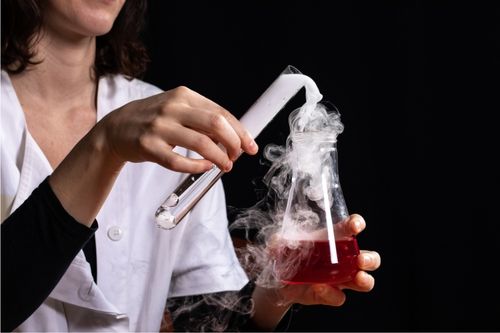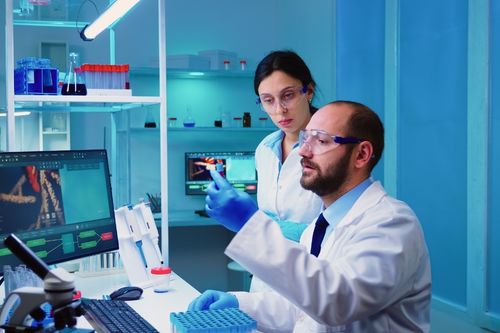Table of Contents
Chemistry is the study of matter, which is defined as everything that has mass and occupies space, and the changes that it can undergo when subjected to diverse environments and situations. Chemistry is not only used in scientific investigations but is also in everyday life. It represents the advancement of society and humanity. Many scientists have made valuable contributions to the field of chemistry and are well-known as fathers of chemistry. In this blog, we will try to find the answer to who is the father of chemistry.
Antoine-Laurent Lavoisier

Lavoisier, known as the ‘Father of Chemistry,’ was born in Paris in 1743. As the son of a rich Parisian lawyer, he followed in his father’s footsteps and studied law. Despite his law degree, Lavoisier’s primary passion was science, which he pursued with zest while working a demanding public schedule.
Early life
- On August 26, 1743, Antoine-Laurent Lavoisier was born into a wealthy family in Paris, France’s capital city.
- His father Jean-Antoine Lavoisier was a lawyer in the Paris Parliament.
- His mother’s name was Émilie Punctis, and her family’s fortune came from a butcher shop. She died when Antoine was five years old, leaving him a sizable inheritance.
- Between the ages of 11 and 18, Antoine attended Collège des Quatre-Nations, a university college in Paris. In his final two years, he studied general courses, including science.
- Despite his interest in the sciences, he enrolled in the college’s law school at the age of 18, intending to follow in his father’s footsteps. His father also pushed him to think of science as a hobby rather than a serious job.
- After two years of law school, Antoine Lavoisier received his bachelor’s degree. In 1764, He got a license to practice law a year later but opted against it.
Contributions to the field of chemistry
- Antoine Lavoisier transformed chemistry. He named the elements carbon, hydrogen, and oxygen, discovered the role of oxygen in combustion and respiration, discovered that water is a compound of hydrogen and oxygen, discovered that sulfur is an element; and contributed to the evolution of chemistry from a qualitative to a quantitative science.
- Antoine Lavoisier conducted his first combustion tests in 1772. He said that when phosphorus and sulfur burn, they acquire weight when mixed with air and produced acidic byproducts. Over the next fifteen years, Lavoisier worked on combustion, eventually disproving the phlogiston hypothesis of burning.
- In 1778, Lavoisier proposed a new theory of combustion in which combustion was defined as the reaction of a metal or an organic substance with that portion of common air that he referred to as ‘eminently respirable.’ The following year, he named it ‘oxygen’ after the Greek term for ‘acid generator.’ One of Lavoisier’s great accomplishments was discovering the significance of oxygen in combustion.
- Antoine Lavoisier invented the term ‘hydrogen’ in 1783 for the gas that Henry Cavendish had identified as a new element in 1766. Cavendish referred to the gas as combustible air. In 1783, Lavoisier began a series of experiments on the composition of water along with French mathematician Pierre Simon de Laplace. To obtain ‘water in a very pure form,’ Laplace and Lavoisier burned jets of hydrogen and oxygen in a bell jar over mercury. The quantitative results were sufficient to support the observation that water was a composite of two gases, hydrogen, and oxygen, rather than an element.
- Lavoisier conducted respiratory physiology studies with Pierre Simon de Laplace in 1782-83. The researchers used a calorimeter to calculate the amount of heat emitted by a guinea pig over a set period of time. They also measured the amount of carbon dioxide (then known as fixed air) emitted by the guinea pig during the same time frame. They discovered that an equal amount of heat was produced when enough carbon burns in the ice calorimeter to produce the same amount of carbon dioxide as the guinea pig exhaled. Lavoisier and Laplace deduced that respiration was similar to slow combustion. This allows the living animal to keep its body temperature higher than the temperature of its surroundings.
Father of modern chemistry- John Dalton and Robert Boyle

- Robert Boyle was an Anglo-Irish natural philosopher, chemist, physicist, and inventor. Boyle is widely recognized today as the first modern chemist, and thus one of the founders of modern chemistry as well as one of the forefathers of contemporary experimental scientific technique.
- John Dalton was a chemist, physicist, and meteorologist from England. He is most well-known for introducing the atomic theory into chemistry and for his work on color blindness, better referred to as Daltonism after him.
Who is the father of chemistry
- If you’re asked to name the father of chemistry, your best bet will be Antoine-Laurent Lavoisier, who published ‘Elements of Chemistry’ in 1787.
- He collected the first full list of elements at the time, found and named oxygen and hydrogen, contributed to the development of the metric system, assisted in revising and standardizing chemical nomenclature, and discovered that matter retains its mass even when it changes forms.
- Jabir ibn Hayyan, a Persian alchemist who lived around 700 AD and applied scientific ideas to his studies, is another popular candidate for the title of father of chemistry.
- Other people called the ‘Father of Modern Chemistry’ include Robert Boyle, Jöns Berzelius, and John Dalton.
Key takeaways
- Antoine-Laurent Lavoisier, Robert Boyle, and John Dalton developed new series of laboratory experiments that brought about a change in the practice and principles of chemistry.
- Antoine Lavoisier transformed chemistry by naming the elements carbon, hydrogen, and oxygen, discovering the role of oxygen in combustion and respiration, inventing that water is a compound of hydrogen and oxygen, that sulfur is an element, and contributed to the evolution of chemistry.
- Antoine Lavoisier is the father of chemistry due to his contributions to writing elements of chemistry and his combustion-related experiments. John Dalton and Robert Boyle are the fathers of modern chemistry.
Did you find this blog informative? If so, please share your thoughts in the comments section below. Click here to contact us for more information on who is the father of chemistry. We would be happy to assist you with your queries.
Liked this blog? Read next: Career in BSc chemistry | Syllabus and career options
FAQs
Q1. Is Albert Einstein a chemist?
Ans-Though Einstein is generally a physicist (he got the Nobel Prize in Physics in 1921), his study had significant ramifications for chemistry. In 1905, he received his Ph. D.
Q2. What is the old name of chemistry?
Ans-The term chemistry derives from the word alchemy, which appears in several versions in European languages. The term alchemy derives from the Arabic word kimiya.
Q3. How can I learn chemistry?
Ans- Follow the steps given below to learn chemistry
- Review the study material before going to class.
- Seek understanding.
- Take good notes.
- Practice daily.
- Take advantage of lab time.
- Use flashcards.
- Use study groups.
- Break large tasks into smaller ones







